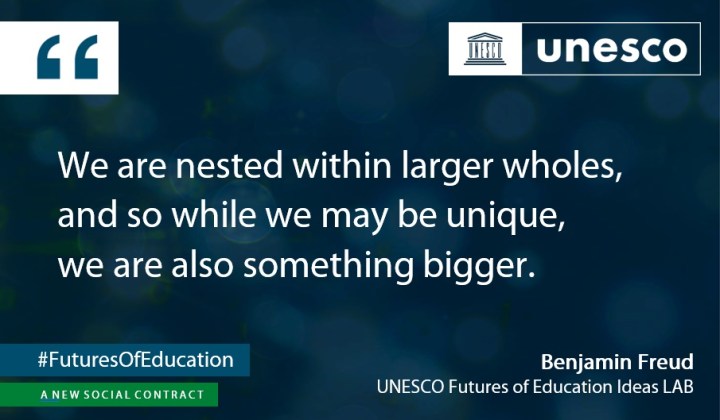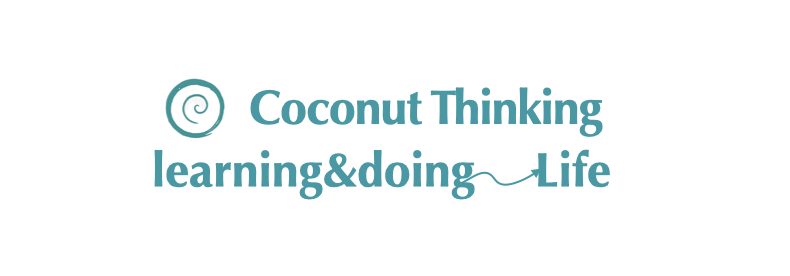
This article was published on UNESCO’s IDEAS LAB on 11 March 2022.
While the UNESCO report Futures of Education came out with much fanfare and generated much excitement, its most powerful consideration has received surprisingly little attention. It’s not that the authors haven’t put this consideration front and center—on the contrary—yet somehow it has eluded the spotlight. Perhaps this is the nature of the game. Proposing a new social contract that redefines the purpose of education as a common good that should involve everyone, everywhere coming together to repair a damaged planet requires a soft touch. The report had to be edgy enough to pique curiosity, but not so much so that it scares people off. This is the first step of a rallying cry.
This cry might just end up muffled because the report underemphasizes what makes it special; one little letter in a 160-page report*. That letter is the “s” in the word futures that sits in its title. This is not only the story of the many different futures we may have. This is the story of the many different futures we will carve for ourselves, which might converge if we begin with inner work. From this might come a common set of ethics that will allow us to share futures—and it starts with making sure the planet has a future.
The report opens the door to this, but doesn’t walk in. It flirts with post-humanism—calling us to unlearn the arrogance of humans and “re-wild” curriculum—but shies from explicitly adopting a living systems paradigm, which recognizes that all life has its own unique essence and exists as a nested whole within larger wholes. Each of these wholes is an ecosystem unto itself and works with an infinite number of other ecosystems in a dynamic of reciprocal development. To create “futures that are shared and interdependent” means to recognize that we are all wholes with a unique essence. Essence is what makes you, you. You cannot be replicated.
Essence is not static. It is the energy that drives our learning and actions, that shapes what it means to flourish. Yet from flourishing as individuals, we thrive as communities, as ecosystems. From the many flowers emerges a garden, which also has essence. When essence (that energy!) is unleashed and liberated, we become who we are, to borrow from Nietzsche. When it is diminished or suppressed, we become less who we are. Essence reaches its highest potential when we engage in actions in which we are completely immersed, through which we lose all sense of time and space, when we feel we are who we are, with no separation between us and our actions.
We are perpetually at the nexus of past and future, ever changing through the infinite interactions with everything in the universe, interactions that are not events but processes: there is no beginning and no end to the interactions, there is no separation between us and the universe. We are enfolded within it. We are the flowing water of a river, not the immobile stone around which the current passes.
This isn’t woo woo spirituality. This is the quantum theory. This is also the teachings of many ancient wisdoms. It is also biology: every day 330 billion of your cells are replaced. You are not the same cells you were 100 days ago!
If we are not static, if we are processes— flowing water rather than immobile stones—that unfold at the point when past and present meet, then we are not beings, we are becomings. We are not nouns, we are verbs. Understanding that everything is change is the key to understanding that we are impermanent, that we are nodes within the fabric of the universe.
This is why pausing on the UNESCO report proposing shared futures is critical, but if we are not careful, we may miss the true power of what the report offers.
If each of us has a unique essence that is flowing, we need a vision to direct the course of the flow—what do we want to become? This vision is personal and nothing connects our many respective visions or our futures unless we do the inner work of self-reflection to understand what we want become and make choices toward realizing our becoming. The inner work is key because it opens the door to consciousness, to social consciousness.
How do we make sure that the personal visions become shared visions to create shared futures? The UNESCO report is an invitation, but there is no model for the inner work. Inner work is personal.
Yet there is a way to connect many visions while honoring our individual essences as they chart the courses of our becomings. Living systems paradigms help us understand we are nested within larger wholes and so while we may be unique, we are also something bigger. Just like your heart is whole yet belongs to a cardiovascular system that itself belongs to you, you belong to a community, to a species, to all life on earth. Since we are nested wholes, ecosystems within ecosystems, there is no separation. We are our hearts like we are our communities.
It therefore makes as little sense to damage the larger ecosystem because that would mean damaging ourselves and this is the key to creating shared visions, shared futures. This awareness is an awakening, a generation of social consciousness that extends beyond the human and into the natural world.
This awareness is the next step in us becoming as a collective, together. Ethics is the glue that keeps the individuals together, and there is one specific ethical question that guides our choices and actions:
How do my actions contribute to the thriving of the ecosystem?
If we do the inner work to see ourselves not as beings but becomings, if we understand that we are nested wholes (ecosystems) within larger wholes, then we live and act to contribute to the thriving of all life. That is our shared futures. Respecting our unique essences, coming together to realize we are all part of one universe.
* UNESCO’s background to the report was written around the idea of becomings.

The idea that we are not static but rather constantly evolving and changing beings, often referred to as “becomings” rather than fixed “beings,” has profound implications for our understanding of education policy and opportunities for influence in this context.
Education policies are not static or unchanging. They, too, are subject to constant evolution and adaptation. As our understanding of effective teaching methods, learning styles, and educational needs evolves, so do the policies that govern education. Understanding the impermanence of policies is essential for educators and policymakers to remain flexible and open to change.
LikeLike
At first, I wasn’t sure what I was getting into when I began reading this entry. However, I quickly found myself hooked and wanted to consider many ideas shared on a more critical level. One quote that stood out to me the most was, “Essence is not static. It is the energy that drives our learning and actions, that shapes what it means to flourish. Yet from flourishing as individuals, we thrive as communities, as ecosystems. From the many flowers emerges a garden, which also has essence.” (para 4). I found this to beautifully capture the relationship between the nature of essence and the influence on growth and community. Essence is not stuck or fixed in position, but rather it is the motivation that propels us forward into our own learning and actions that continue to help us grow and flourish as an individual. There is so much room for growth, and the more we are able to flourish ourselves as individuals, the better we are for our community and the people. There are a lot of insights to gain from the ideas you have shard here.
Thank you for sharing!
LikeLiked by 1 person
Thank you for your kind words, Joey!
LikeLike
This is beautiful.
You describe the concentric circles of the human organism that begin at a level much smaller than the self and end, for just a timeless moment, with the sum of all people before we merge with something larger and become all. I love it, and I agree with it. I also appreciate your thought that we must become our actions and our actions must be us. I have always thought (perhaps it is in a same or similar vein to your thoughts) that the space between our truest self and the actions we take is energy bleed that is at best wasted and at worst hurting us and injuring the site from which it exits; the smaller we can make this space, the more we are capable of direct actions of Love.
Thank you for this.
LikeLiked by 1 person
“the space between our truest self”… simply beautiful. Thank you for this and your comment.
LikeLike
This is a beautiful little piece if insightful literature. I chuckled a bit when you said we “are not being, but becomings. We are not nouns, we are verbs,” because I have always thought of the word “human being” as a Be-Verb. Your perspective of living in/ for the future has caused a bit of a paradigm shift for me, less of a “being in the moment” like a Zen monk, and more of Native American “how will my actions effect the 7th generation” action thought mentality. Thank you.
LikeLike
I appreciate how you are stressing the importance of appreciating one’s uniqueness and understanding that all cultures and experiences matter and contribute to the greater whole.
LikeLike
I fully agree, that it takes inner worth to see and understand one’s place in the world, while noticing the common humanity that we share. Your argument is so simple, but effective–as members of this world, we must work to improve it, and not injure it. People become siloed into their own experience and forget that these policies affect many. Thanks for your thoughts!
LikeLiked by 1 person
I love the humanisation of growing and changing. When you spoke about how as individuals we grow and change, but that in turn effects everything around us, I thought about how we ebb and flow as a society, and how our policies and laws need to ebb and flow with us. A policy will have a ripple effect that we can’t always predict, and we need to be willing to ride the wave.
LikeLiked by 1 person
And sometimes those policies are local, sometimes they’re left unwritten. Thank you Emily!
LikeLike